Related Research Articles

Brunswick Records is an American record label founded in 1916.

The Monterey International Pop Music Festival was a three-day concert event held June 16 to June 18, 1967 at the Monterey County Fairgrounds in Monterey, California. The festival is remembered for the first major American appearances by the Jimi Hendrix Experience, the Who and Ravi Shankar, the first large-scale public performance of Janis Joplin and the introduction of Otis Redding to a mass American audience.
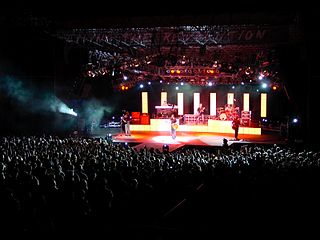
A sound reinforcement system is the combination of microphones, signal processors, amplifiers, and loudspeakers in enclosures all controlled by a mixing console that makes live or pre-recorded sounds louder and may also distribute those sounds to a larger or more distant audience. In many situations, a sound reinforcement system is also used to enhance or alter the sound of the sources on the stage, typically by using electronic effects, such as reverb, as opposed to simply amplifying the sources unaltered.

BolexInternational S. A. is a Swiss manufacturer of motion picture cameras based in Yverdon located in Canton of Vaud. The most notable products of which are in the 16 mm and Super 16 mm formats. Originally Bol, the company was founded by Charles Haccius and Jacques Bogopolsky in 1925. Bolex is derived from Bogopolsky′s name. In 1923 he presented the Cinégraphe Bol at the Geneva fair, a reversible apparatus for taking, printing, and projecting pictures on 35-mm. film. He later designed a camera for Alpa of Ballaigues in the late 1930s.

Altec Lansing is a U.S. audio electronics company founded in 1927. Their primary products are loudspeakers and associated audio electronics for professional, home, automotive and multimedia applications.

Professional audio, abbreviated as pro audio, refers to both an activity and a category of high quality, studio-grade audio equipment. Typically it encompasses sound recording, sound reinforcement system setup and audio mixing, and studio music production by trained sound engineers, audio engineers, record producers, and audio technicians who work in live event support and recording using mixing consoles, recording equipment and sound reinforcement systems. Professional audio is differentiated from consumer- or home-oriented audio, which are typically geared toward listening in a non-commercial environment.
Smithsonian Folkways is the nonprofit record label of the Smithsonian Institution. It is a part of the Smithsonian's Smithsonian Center for Folklife and Cultural Heritage, located at Capital Gallery in downtown Washington, D.C. The label was founded in 1987 after the family of Moses Asch, founder of Folkways Records, donated the entire Folkways Records label to the Smithsonian. The donation was made on the condition that the Institution continue Asch's policy that each of the more than 2,000 albums of Folkways Records remain in print forever, regardless of sales. Since then, the label has expanded on Asch's vision of documenting the sounds of the world, adding six other record labels to the collection, as well as releasing over 300 new recordings. Some well-known artists have contributed to the Smithsonian Folkways collection, including Pete Seeger, Ella Jenkins, Woody Guthrie, and Lead Belly. Famous songs include "This Land Is Your Land", "Goodnight, Irene", and "Midnight Special." Due to the unique nature of its recordings, which include an extensive collection of traditional American music, children's music, and international music, Smithsonian Folkways has become an important collection to the musical community, especially to ethnomusicologists, who utilize the recordings of "people's music" from all over the world.
Edward Herbert Beresford "Chip" Monck is an American Tony Award nominated lighting designer, most famously serving as the master of ceremonies at the 1969 Woodstock Festival.
The babysitter and the man upstairs — also known as the babysitter or the sitter — is an urban legend that dates back to the 1960s about a teenage girl babysitting children who receives telephone calls from a stalker who continually asks her to "check the children". The basic story line has been adapted a number of times in movies. The 1950 murder of teenage babysitter Janett Christman is commonly cited as a source of the legend.
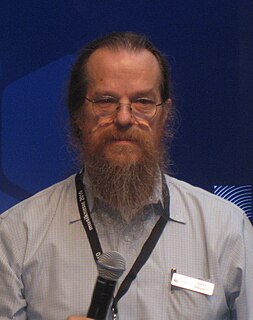
John Meyer is a pioneer in the sound reinforcement industry. In 1979 he founded Meyer Sound Laboratories with his wife, Helen Meyer.
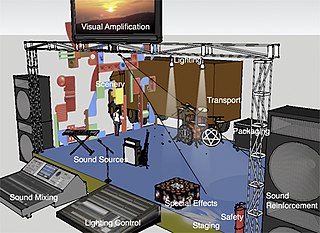
Live performance events including theater, music, dance, opera, use production equipment and services such as staging, scenery, mechanicals, sound, lighting, video, special effects, transport, packaging, communications, costume and makeup. They all share the same goal: to convince live audience members that there is no better place that they could be at the moment. This is achieved through establishing a bond between performer and audience. Live performance events tend to use visual scenery, lighting, costume amplification and a shorter history of visual projection and sound amplification reinforcement.

An audio engineer helps to produce a recording or a live performance, balancing and adjusting sound sources using equalization and audio effects, mixing, reproduction, and reinforcement of sound. Audio engineers work on the "...technical aspect of recording—the placing of microphones, pre-amp knobs, the setting of levels. The physical recording of any project is done by an engineer ... the nuts and bolts." It's a creative hobby and profession where musical instruments and technology are used to produce sound for film, radio, television, music, and video games. Audio engineers also set up, sound check and do live sound mixing using a mixing console and a sound reinforcement system for music concerts, theatre, sports games and corporate events.
Charles Peter Harry Morgan was the managing director of the Morgan Motor Company, a UK car manufacturer.
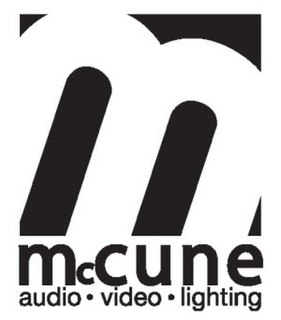
McCune Audio Video Lighting is an American company based in South San Francisco, California, with offices in Monterey and Anaheim. It is one of the oldest and largest audio visual rental and sound services in the U.S. McCune was founded in 1932 by Harry McCune Sr, McCune AVL provides audio, lighting and high-definition video services to events as varied as outdoor festivals such as the Monterey Jazz Festival, and the Bohemian Grove, and to arena conferences such as TED.

The Big Sur Folk Festival, held from 1964 to 1971 in California, was an informal gathering of prominent and emerging folk artists from across the United States. Nancy Jane Carlen (1941-2013) was working at the Esalen Institute when Joan Baez was asked to lead workshops on music. Carlen was a good friend of Baez, and they decided to invite other artists, which turned into the first festival.
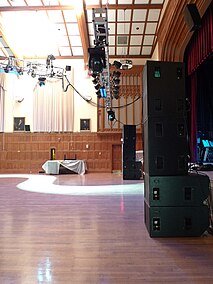
A professional audio store is a retail business that sells, and in many cases rents, sound reinforcement system equipment and PA system components used in music concerts, live shows, dance parties and speaking events. This equipment typically includes microphones, power amplifiers, electronic effects units, speaker enclosures, monitor speakers, subwoofers and audio consoles (mixers). Some professional audio stores also sell sound recording equipment, DJ equipment, lighting equipment used in nightclubs and concerts and video equipment used in events, such as video projectors and screens. Some professional audio stores rent "backline" equipment used in rock and pop shows, such as stage pianos and bass amplifiers. While professional audio stores typically focus on selling new merchandise, some stores also sell used equipment, which is often the equipment that the company has previously rented out for shows and events.

Li Shanchang was the founding chancellor of the Ming dynasty. Deemed the recognized leader of the West Huai (Huaixi) faction, and given first rank among the six dukes in 1370, it is said that Li was the Emperor Hongwu's closest comrade during the war, and greatest contributor to his ultimate victory and thus establishment of the Ming Dynasty. Deeply trusted by the Emperor, Hongwu consulted Li on institutional matters, but became "bored with Li's arrogance" in old age.
Dan Doo is a British folk song that was brought to the United States. It was recorded by the Wisconsin Folk Song Recording Project. Max Hunter also recorded the song. The version he recorded is part of the Max Hunter Song Collection at the University of Missouri. Frank Proffitt recorded it on Frank Proffitt Sings Folk Songs on Folkways Records. It has been published as a children's ballad and a folk song. Versions performed by Fred Smith and Frank Payne have also been recorded.
Abe John Jacob is an American sound designer and audio engineer. Called the "Godfather of Sound", Jacob greatly influenced the design of sound reinforcement in modern musical theatre, and was one of the first persons credited in the role of sound designer on Broadway, with a sound designer credit in Playbill in 1971.

Robert Vernon Cavin is an American audio engineer who built the first monitor mixing console, the first multi-angle monitor loudspeaker, and the first integrated processing/amplifier package for a 3-way loudspeaker. He was chief engineer of McCune Sound in San Francisco in the 1970s, and also vice president in the 1980s. In 1992 he accepted the chief engineer position at Apogee Sound where he designed the DA Series Class-H digitally controlled amplifier, winning the 1994 TCI Product of the Year Award. In 2000 he joined Furman Sound, and designed an interface system for Smaart users, and a new power conditioning system. Cavin's electronic designs were nominated five times for TEC Awards, in 1994, 1995, 1997, 1999 and 2001.
References
- ↑ https://books.google.com/books?id=3tPHDwAAQBAJ&pg=PT153 The Last Seat in the House: The Story of Hanley Sound, page 153, By John Kane
- ↑ https://books.google.com/books?id=bnSFDwAAQBAJ&pg=PA142 Music on Stage Volume III, Volume 3, page 142, edited by Fiona Jane Schopf